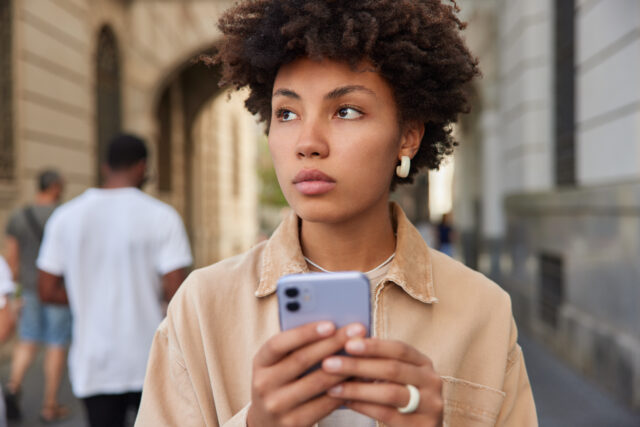Loneliness has become a paradoxical epidemic these days — we’re constantly ‘connected’ via our phones, but many people are silently struggling with isolation.

You may think you’re doing just fine, plodding along in life without a care in the world, but is that really true? If you recognise these feelings, you may be a lot lonelier than you think or would like to admit to yourself (or anyone else).
1. You constantly refresh your social media feeds, even when there’s nothing new to see.
 Source: Unsplash
Source: Unsplash It’s become an almost involuntary action — your thumb hovers over the refresh button, hoping for a new like, comment, or message. This compulsive behaviour isn’t just indicative of FOMO; it’s a digital cry for connection. You’re not really interested in the content itself, but rather the fleeting sense of belonging it provides.
2. You’re talking to yourself more often these days, and not just to remember where you’ve put your keys.

Self-talk is normal, but if you’ve noticed an uptick in your inner monologues, it might be a sign of loneliness. It’s as if you’re trying to fill the silence with your own voice, creating a proxy for the human interaction you’re craving. Wouldn’t it be better to talk to a real person?
3. You linger in shops or cafes, hoping the staff will strike up a conversation.

Your quick coffee run has turned into an hour-long affair, not because you’re relaxing with your latte, but because you’re secretly hoping the barista might chat with you beyond the usual pleasantries. You find yourself asking unnecessary questions about the menu or browsing items you have no intention of buying, just to prolong your time in a space where human interaction is possible. This is really sad!
4. You have an intense emotional attachment to fictional characters or celebrities.

Suddenly, that TV series isn’t just entertainment — it’s become a lifeline. You’re deeply invested in the lives of fictional characters, and you feel genuine grief when a series ends or a character arc concludes. Maybe you’ve even started following celebrities on social media with an enthusiasm that borders on obsession, feeling as if you truly know them. Parasocial relationships are a substitute for real-world connections, and that’s extremely unhealthy.
5. You overthink every social interaction, and replay conversations in your head for days.

Talking to your colleague at lunch becomes a mental marathon. You analyse every word, facial expression, and tone, searching for hidden meanings or things you might have done wrong. You’re so worried about maintaining the few connections you have that you scrutinise every single encounter, hoping to perfect your social performance.
6. You treat your pet like a human roommate, complete with full conversations and shared meals.

Spot isn’t just a dog anymore; he’s your confidant, therapist, and dinner companion. You have full-blown conversations with your pet, sharing the minutiae of your day and even asking for advice. Of course, the bond between humans and animals is special, but it’s like you’re trying to fill a void left by human relationships.
7. You get physical symptoms like unexplained aches or a weakened immune system.

Loneliness isn’t just something that happens emotionally; it can manifest physically. Maybe you’re catching colds more frequently, or experiencing unexplained headaches and muscle tension. These aren’t psychosomatic symptoms, but rather the result of how chronic loneliness affects your body. Prolonged feelings of isolation can increase stress hormones and inflammation, both of which can affect your health in negative ways.
8. You agree to plans you don’t really want, just to avoid being alone.

Suddenly, that work dinner you’d normally avoid sounds appealing, or you’re saying yes to events that you’re completely uninterested in. You’re not trying to be more social, you’re trying to fill your calendar to avoid confronting the emptiness you feel when you’re alone.
9. You have an unhealthy relationship with food, either eating too much or not at all.

Maybe you’re mindlessly snacking throughout the day more often because you’re using food as a source of comfort and distraction. Or, maybe you’ve lost interest in meals altogether, with the effort of cooking for one seeming pointless. This is your body’s response to emotional emptiness.
10. You get sudden bursts of nostalgia for past relationships, even the not-so-great ones.

Out of nowhere, you find yourself reminiscing about your ex from uni or that childhood friend you lost touch with years ago. These weren’t perfect relationships by any means, but in your current state of loneliness, they’ve taken on a rosy glow. You might even be tempted to reach out, not because you genuinely miss these people, but because you’re craving the connection they represent. Don’t do it!
11. You treat customer service calls as social opportunities.
 Source: Unsplash
Source: Unsplash That call to your mobile provider about a billing issue has turned into a 30-minute chat. You find yourself sharing personal stories with the call centre representative, or asking about their day (and actually caring about the answer). It’s good to be polite, but trying to engage with strangers on this level proves you need deeper human interaction in your daily life.
12. You have a heightened sensitivity to rejection, even in minor situations.
 Source: Unsplash
Source: Unsplash Not getting a prompt reply to your email to a colleague sends you into a spiral of self-doubt. An unanswered text message feels like a personal slight. This doesn’t just point to insecurity, it’s a symptom of your loneliness. When you’re lacking in strong, consistent relationships, every potential connection takes on monumental importance.
13. You have an intense fear of missing out, even for events you wouldn’t normally enjoy.

Scrolling through social media fills you with a sense of panic. Seeing other people socialising triggers an irrational fear that you’re missing out on major life experiences. This isn’t just standard FOMO; it’s a deeper anxiety stemming from your loneliness.
14. You go through sudden mood swings or irritability, especially in social situations.

Your emotions seem to be on a roller coaster, particularly when you’re around other people. One minute you’re craving company, the next you’re irritated by the slightest social friction. The desire for connection conflicts with the discomfort and anxiety that prolonged isolation can create, resulting in these unpredictable mood shifts. Your emotional regulation is all out of whack.
15. You feel like an alien observing human behaviour, rather than a participant in it.

Social situations have started to feel surreal, as if you’re watching a film about human interaction rather than engaging in it yourself. You find yourself studying how others converse, laugh, and connect, feeling like an outsider trying to decipher a foreign language. This sense of detachment isn’t just social anxiety; it’s a sign that loneliness has created a rift between you and the social world.




